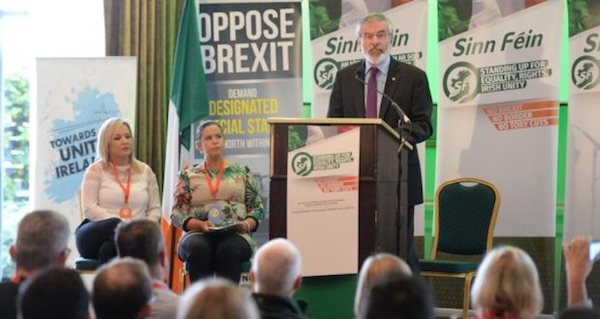
Sinn Fein’s Gerry Adams has made the first step in his gradual withdrawal from front-line politics in a historic shift which he believes will help pave the way for a new generation of party leaders.
Mr Adams ended years of speculation over his leadership by confirming that he will set out his future intentions at the Sinn Fein Ard Fheis [annual conference] in November, a move which will lead to him stepping aside from the day-to-day political work.
The announcement came at Sinn Fein’s annual ‘think in’ at the Citywest Hotel in County Meath. Mr Adams said he would detail the party’s “planned process of generational change” after November.
At the same event last year, both Mr Adams and lifelong ally Martin McGuinness indicated that they were working towards retirement. Mr McGuinness passed away in March, and it is now thought likely that Mr Adams will begin to take on an ambassadorial or honorary role.
Commentators also believe a ‘new generation’ of party figureheads will be in a stronger position to negotiate possible coalition deals, without the distraction posed by the allegations of IRA activity often directed against Mr Adams.
At the party gathering, the 68-year-old told grassroots members of a plan to achieve “strategic objectives” that includes an “orderly leadership change”.
He said that if again confirmed as party leader at the Ard Fheis in November, as expected, he “will be setting out our priorities and in particular our planned process of generational change, including my own future intentions.”
Mr Adams said the plan was “about preparing the party for the next ten years and to ensure that we are better able to achieve our strategic objectives”.
It is the first time he has indicated a timeframe for the transition, which could potentially see Sinn Fein’s next leader in the Dublin parliament become Tanaiste [Deputy Prime Minister] in a future coalition government under Fianna Fail’s Micheal Martin.
Senior Fianna Fail figures have stressed that as long as Gerry Adams remains as Sinn Fein leader, the party would be blocked from supporting them in a coalition government because Mr Adams would then automatically take on the role of Tanaiste. Despite two decades of peace work, that would still be politically unacceptable for many Fianna Fail members.
‘TOXIC’
However, another series of bullying allegations against Sinn Fein management cast a shadow over Mr Adams speech and undermined the prospects of coalition.
Earlier this week Lisa Marie Sheehy, Sinn Fein’s youngest elected councillor in the 26 Counties, resigned from the party, citing a “bullying culture” and a “toxic atmosphere”.
It is estimated about 20 Sinn Fein councillors in the South are currently affected by various disputes, out of a total of 159, amid claims of bullying, sham investigations, kangaroo courts, whispering campaigns and diktats.
A number of senior Sinn Fein politicians, including Martin Ferris, Pearse Doherty and David Cullinane, have been implicated in the increasingly public disputes. Ms Sheehy, a 23-year old Limerick councillor and postgraduate student of politics, described the process of investigation as a game of “pass the parcel”.
Prominent Tipperary councillor Seamie Morris said his mental health had been affected by the party’s “dirty tricks”, while Westmeath councillor Paul Hogan claimed he had received a death threat.
Senior Fianna Fail figures have denounced Sinn Fein’s Machiavellian approach to internal party dynamics as “cult-like” and requiring fundamental change before coalition can be considered.
Sinn Fein has denied there is a problem. In each of the instances, a spokesperson has insisted the issue is localised and a result of constituency splits, personality disputes, or communication issues.
Questioned about the latest incident by journalists at the ‘think-in’, Mr Adams responded to the allegations of bullying from Sheehy by insisting that no such culture exists.
“There is no culture of bullying within Sinn Fein and it’s actually very unfair to the members of this party that this allegation has been made,” he said.
![[Irish Republican News]](https://republican-news.org/graphics/title_gifs/rn.gif)
![[Irish Republican News]](https://republican-news.org/graphics/title_gifs/harp.gif)

